Samsung QE43QN90A Review
A 43-inch QLED with a bright outlook
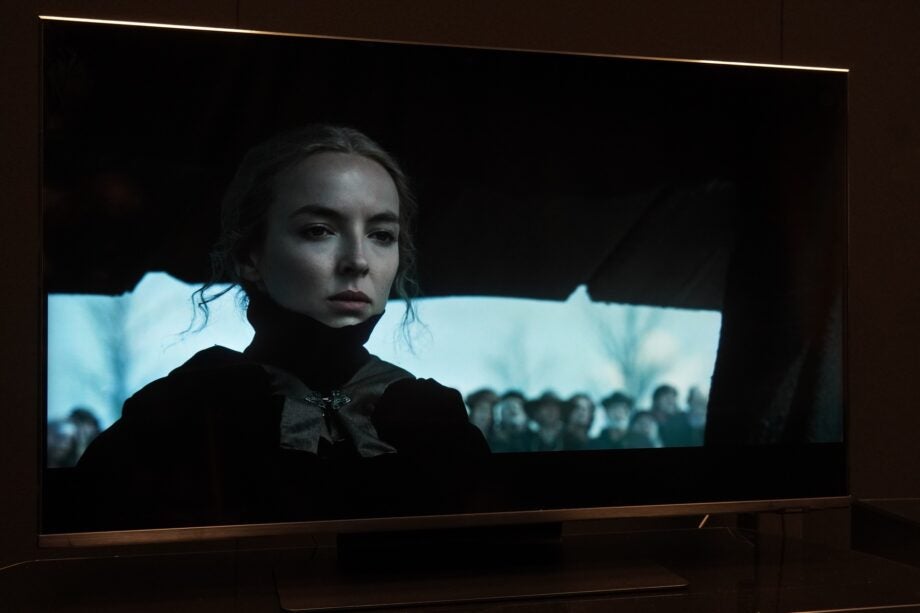

Verdict
The QE43QN90A Mini LED TV is much better specc’d than any 43-incher need be, a capable performer with films, TV and games though it comes at a steep price.
Pros
- Impressive picture for a small-sized set
- Low latency gaming
- Excellent construction
- Plenty of apps, features and connectivity options
Cons
- Expensive
- Susceptible to blooming and backlight bleeding
- Average sound
Availability
- UKRRP: £899
- EuropeRRP: €1299
Key Features
- BacklightFeatures Samsung’s Quantum Matrix Mini LED backlight
- HDMI 2.1One HDMI 2.1 port for eARC, ALLM and VRR
- LatencyFast response times for gaming
Introduction
With current-gen consoles and the introduction of the HDMI 2.1 standard, gaming has turned into a battleground where TV manufacturers look to appeal to the twitchiest of gaming fingers.
LG has been, more or less, the first to integrate gaming tech. But not too far behind is Samsung, and while its TVs don’t boast as wide a breadth of features, their sets are speedy for response times.
The reason I mention this for a 43-inch QLED is the recent trend for smaller sizes to serve as bedroom/gaming room screen for gamers looking for every competitive advantage.
LG views this market as prime real estate for its 48-inch and upcoming 42-inch OLEDs. The QE43QN90A, a 2021 TV, is the Samsung’s current champion in this category, and you’d be hard pressed to find many 43-inch TVs as ambitious as this one.
Design
- Premium, minimalist construction
- Suited for wall-mounting
Most small-sized TVs that pass by our test rooms are, it’s fair to say, not the most aesthetically pleasing. You could not lay that criticism at the feet (or stand) of the QE43QN90A.
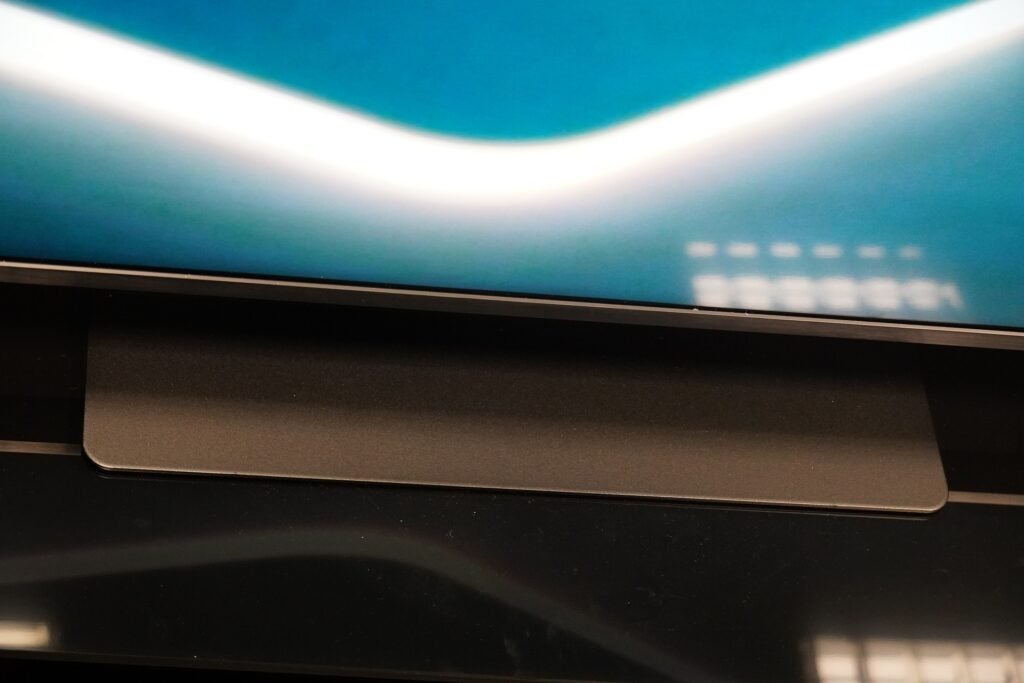
It’s essentially a miniaturised version of the QE65QN94A, so it adheres to same design template Samsung has been pumping out these past few years with its premium sets. The bezel neatly trims the TV’s corners without impinging on the screen, the stand is tough and sturdy, while the uniform depth of the screen (26.9mm) allows it to sit flush against a wall.
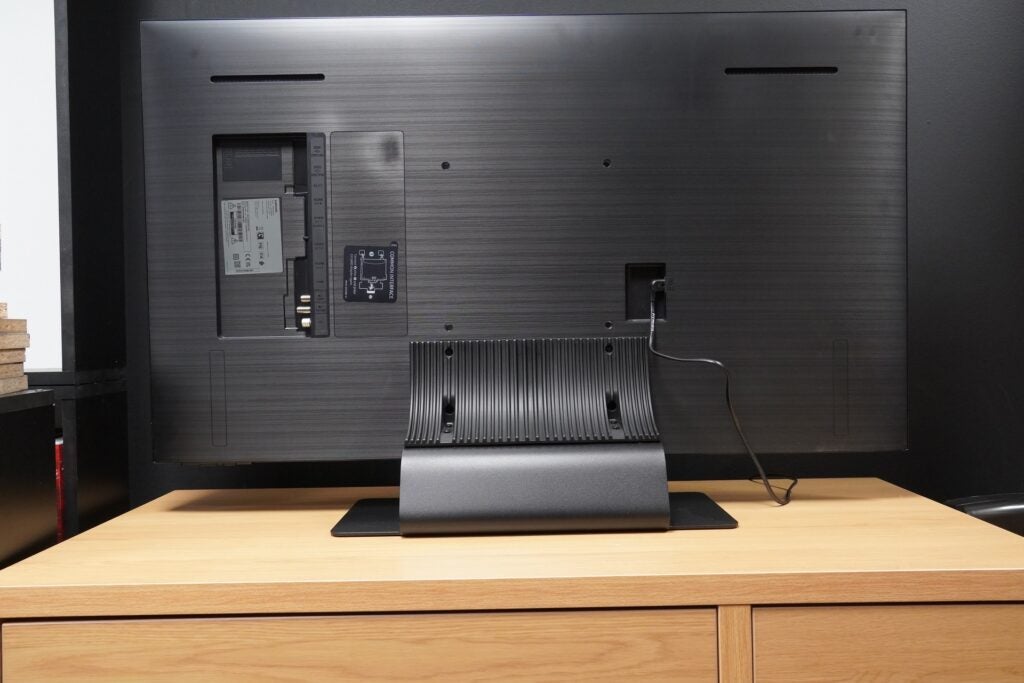
That’s in large part down to Samsung’s Quantum Matrix Mini LED backlight, in which the size of the LED has been shrunken compared to a conventional LED. This has an impact not only in terms of its slimmer form but picture quality, too.
Assembly is simple and the overall quality of construction speaks to Samsung’s high standards. 43-inch TVs aren’t often as well built as this one is.
Interface
- Lots of apps (inc. UK catch-up and on-demand)
- Easy navigation
Tizen 6.0 interface is not too dissimilar to previous iterations. The breadth of apps means your favourites are almost certainly present, with Apple TV, BT Sport, Spotify, Netflix, NOW, Apple Music, Amazon Prime Video and Disney+ among the army of options to peruse.
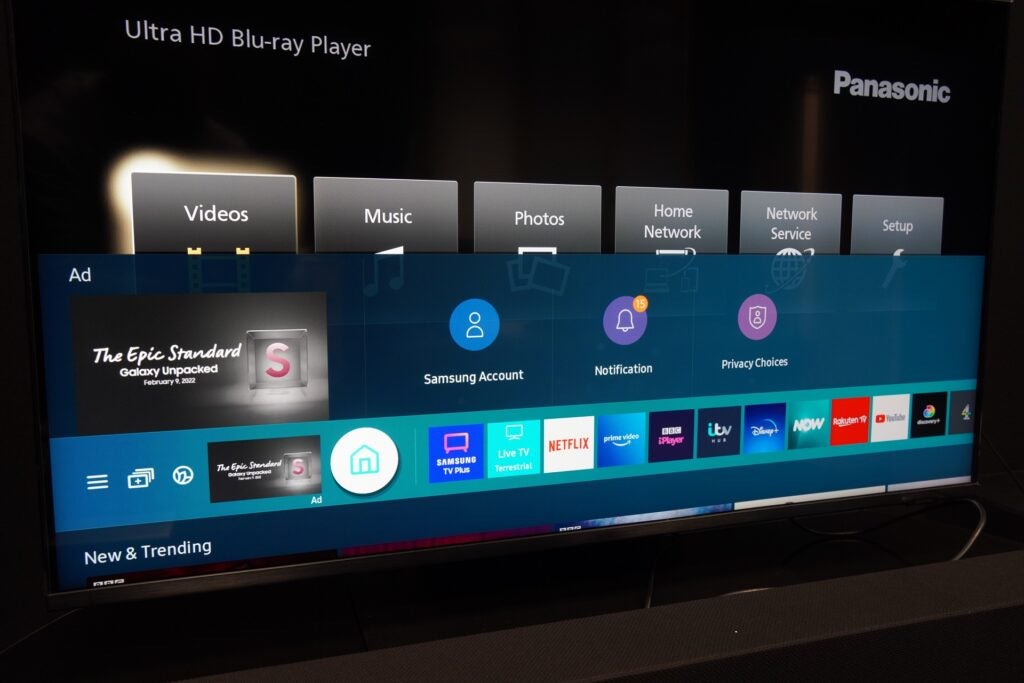
While there’s no Freeview Play for UK customers, all the catch-up apps are present individually. And Samsung’s Freeview alternative is in the form of its subscription-free TV Plus service with the likes of Vevo, Comedy Hub and Baywatch (yes, a channel devoted to Baywatch re-runs) available to peruse.
As a means of navigation the interface is simple to get to grips with, offering an arsenal of picture, sound and feature customisations at your fingertips.
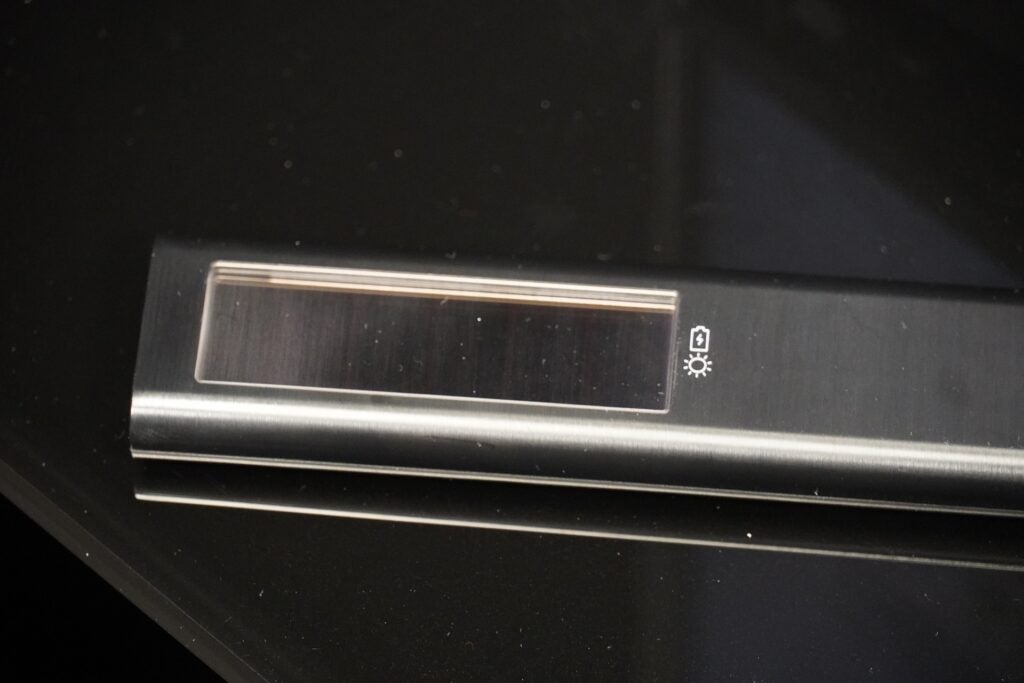
Speaking of fingertips, Samsung supplies two remotes with the QE43QN90A: a standard model and less cluttered version that can be charged by USB-C or through its eco-minded solar panel that soaks up ambient light.
Features
- No FreeSync support
- Fast latency
- One HDMI 2.1 port
Multi-View lets you watch multiple sources simultaneously (two screens only), and there are various ‘intelligent’ AI modes such as Adaptive Picture, Adaptive Sound+, Active Voice Amplifier and Adaptive Volume to influence picture and sound through various sensors and microphones.
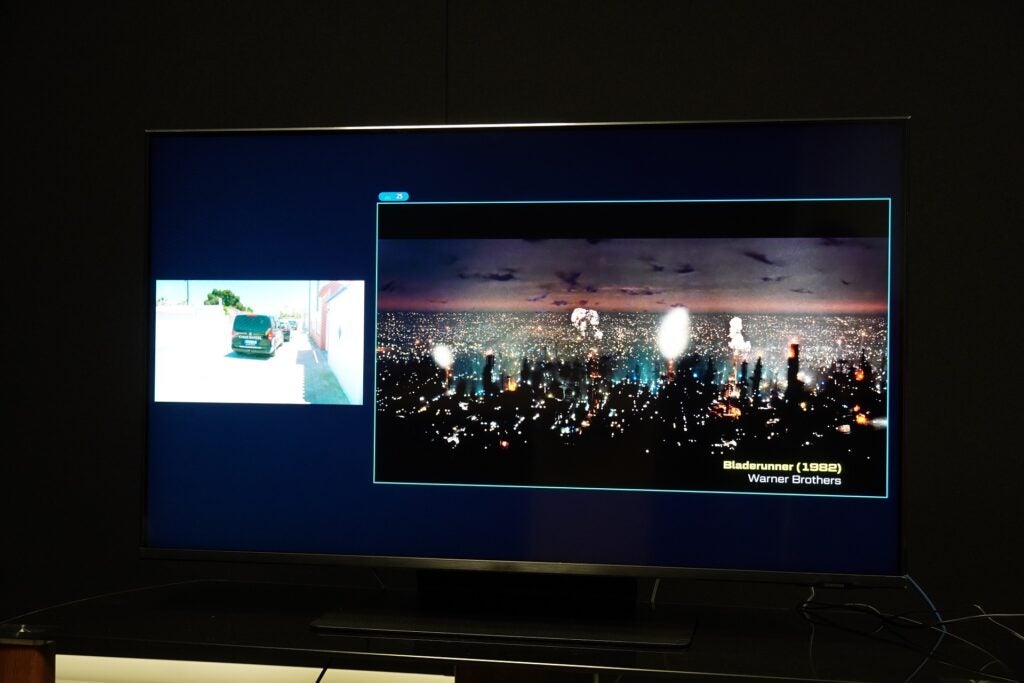
It wouldn’t be a smart TV without a dollop of digital assistants: Alexa, Google and Bixby are accounted for. Given the gaming focus, this 43-inch model has the Super UltraWide Game View that stretches the image to 21:9 and 32:9 ratios, useful for PC warriors who want a wider perspective.
Game Bar offers quick access to settings and gaming-related information by pressing the play/pause button on the ‘smart’ remote. The Auto Low Latency Mode brings about a speedy response time of 9.4ms, one of the lowest I’ve encountered from a 2021 TV. The screen is 60Hz panel so ‘native’ 4K/120Hz isn’t possible but Samsung’s Motion Xcelerator Turbo Plus finesses the picture. And while standard HDMI VRR are present, AMD’s FreeSync VRR isn’t.
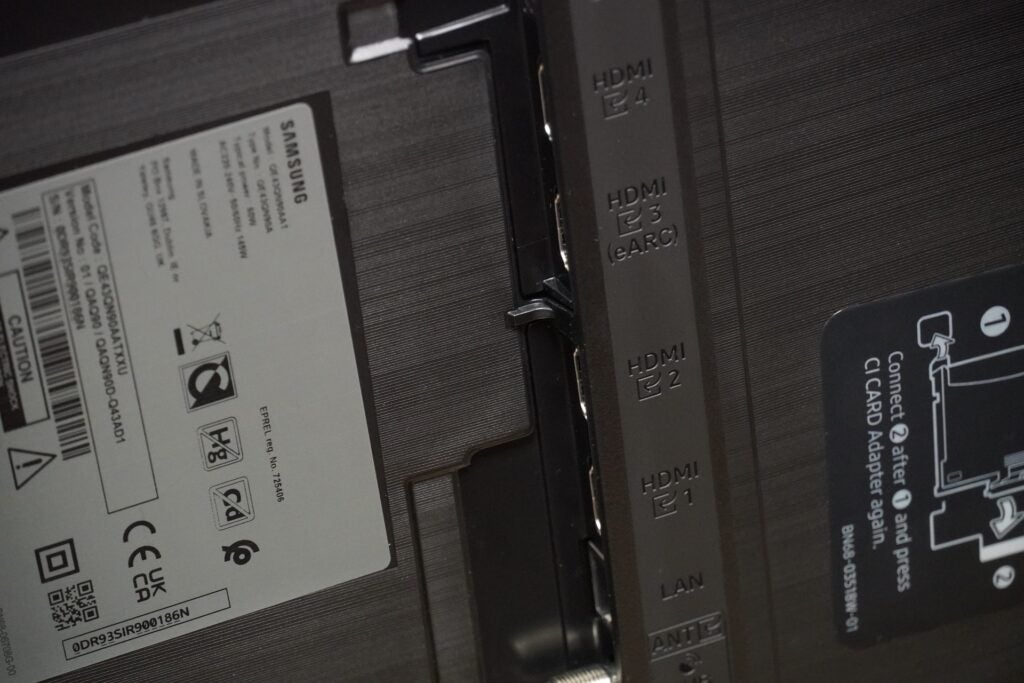
The QE43QN90A’s connections are similar to its bigger siblings with 4x HDMI (3x 2.0, 1x 2.1), Ethernet, optical, a CI+ 1.4 connection, 2 x satellite tuners, an aerial and two USB 2.0 ports. With only one HDMI 2.1 port, there’s just a single slot for either an eARC supporting soundbar or game console which is a pity but not surprising at the size. Wirelessly, there’s Bluetooth 5.2 and Wi-Fi.
Picture quality
- High brightness
- Blooming and bleeding visible
- Good contrast, punchy colours
The introduction of Mini LED technology is an attempt at OLED-like black levels, the dimming zones (of which there are around 330) employed to bring more precision to bright areas and less blooming and backlight bleeding than a ‘regular’ LCD LED TV. The QE43QN90A makes an impact with its brightness, but doesn’t totally mollify blooming and bleeding.
Samsung rates this 43-inch set as capable of 1500 nits of peak brightness, but tests indicate it goes higher – the QN90A delivered nearly 1700 nits on a 10% window in Standard and Game modes. Cinema mode delivers at least 1000 nits (5% window), so for HDR10 content there’s less reliance on tone mapping to manage the brighter parts of an image.
This high brightness approach comes with drawbacks. The scene in Rogue One where the Star Destroyer appears out of the shadow of the under-construction Death Star is a perfect example, with a slight glow that surrounds the destroyer against the black background.
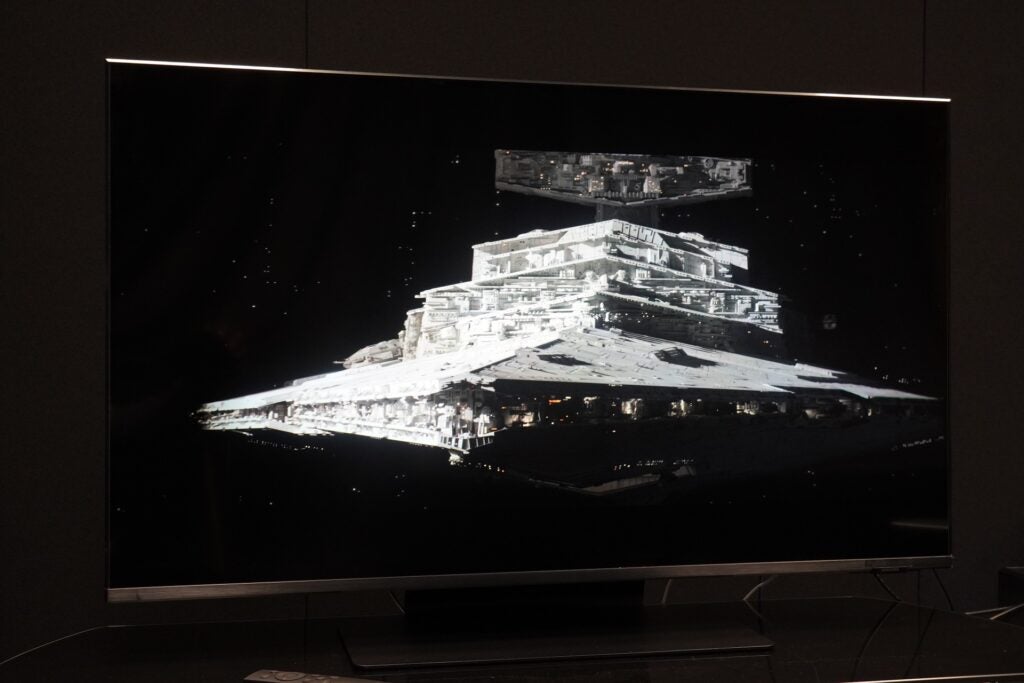
There’s a little backlight bleeding in Ridley Scott’s historical drama The Last Duel, moments where candles on the edge of the frame can just slightly bleed into the black borders, and at wider angles blooming becomes more evident.
But the benefit is fantastically bright images, allied with a wide colour range and super levels of detail and sharpness. The costumes in The Last Duel are revealed to their finest details, from the rivets in armour to jewel-encrusted tunics and threads of fur coats; nothing seems to escape the QN90A’s gaze. Close-ups of faces hold up impressively well in any film I watch, so – if it wasn’t already obvious in lieu of its size – this is a TV you’ll want to get up close to.
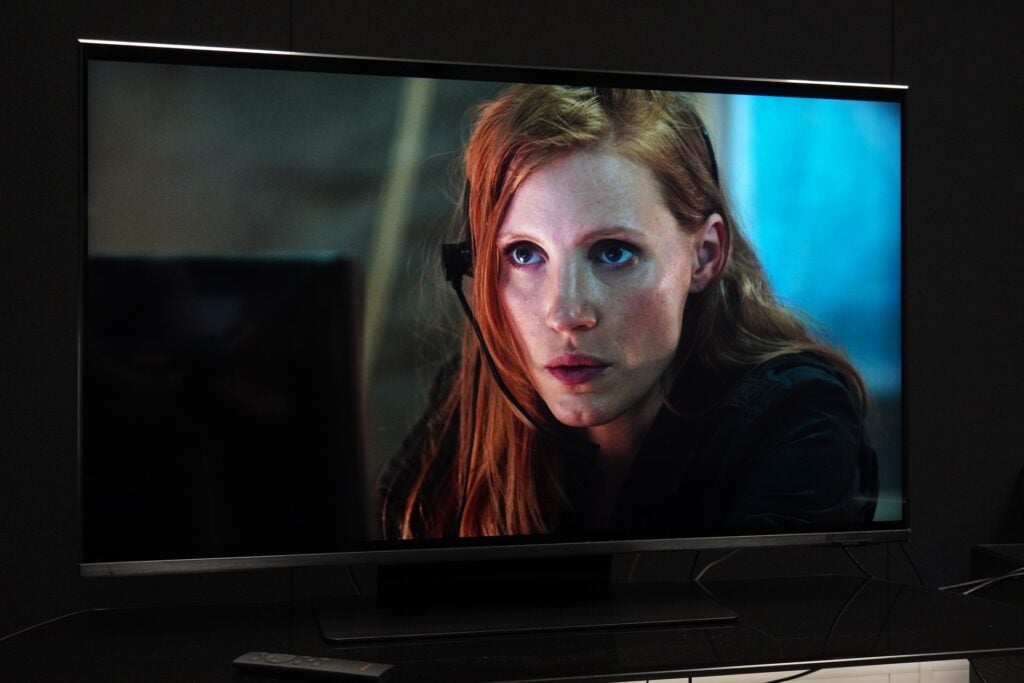
Sharpness is also terrifically conveyed in Passengers. The smaller screen and 4K resolution combine to keep this digitally shot production looking razor sharp; the QN90A produces a beautifully pristine and clean-looking image.
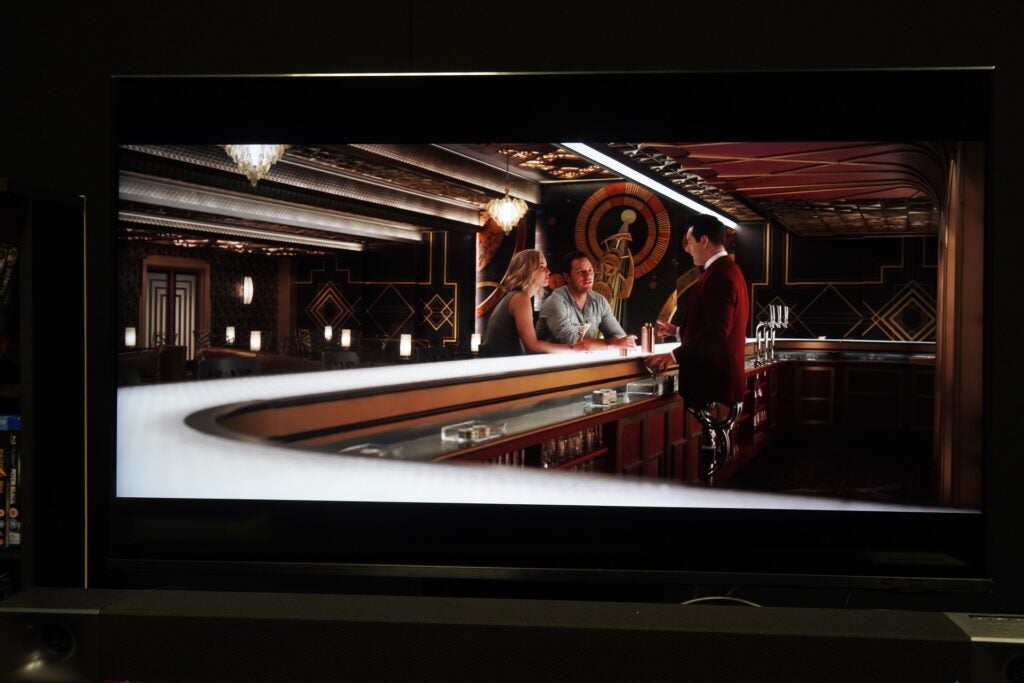
Watched in Cinema/Filmmaker Mode, colours are wide-ranging and punchy, with complexions convincing, though colour accuracy out of the box could be a smidge better. Black depth is convincingly deployed in the climatic sequence of Zero Dark Thirty, with visibility of detail in the darkest parts of the image also finely etched. Contrast pops – HDR content looks splendid on this 43-inch VA panel.
Motion handling is a little wobbly either on or off. The scene in Last Night in Soho, where Eloise makes the journey to London, evinces a little blurriness as the trees whip past the train window. And the lack of wide-viewing technology also means the potency of colours drops off at acute angles. This, however, isn’t a big problem in light of its size.
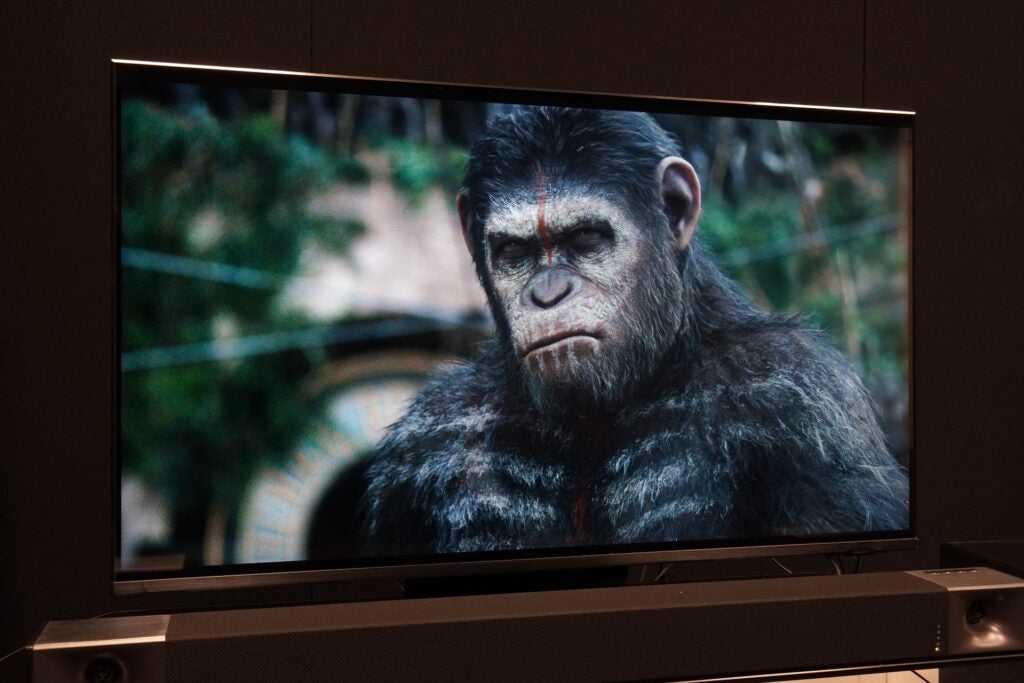
The set’s upscaling impresses with HD content (SD is unsurprisingly blurry and lacking sharpness). Environments and textures in Dawn of the Planet of the Apes (Blu-ray) are given a tidy spruce up, so much so that the softness in the visual effects are a little more pronounced than I expected from the HD version of the film.
Sound quality
- Rather average performer
- Crisp sound quality
With a 20W system at its disposal there’s little in the way of sonic fireworks. Dialogue is clear and crisp, but bass is limited; the dynamic range sees more fizzle than sizzle, and pushing the volume up doesn’t add much scale. For daytime TV it’s perfectly cromulent, though for gaming (or anything else that requires oomph), a pair of Bluetooth headphones or a compact soundbar would be better.
And if you go down the soundbar route, the QN90A sports the ‘lite’ version of the Q-Symphony tech that offloads heavy-duty audio tasks to a compatible (Samsung) soundbar. The QE43QN90A is also equipped with Object Tracking Sound Lite that combines physical built-in speakers (in the bottom) with virtual ones (in the top) to track sound across the screen.
Latest deals
Should you buy it?
If you want a high performing 43-inch set If you’ve not got space for something bigger, this 43-inch model offers performance and features in spades, and may make a fitting companion to a current-gen game console.
If your budget doesn’t stretch to nearly £1000 The QE43QN90A is very expensive by the standards of a 43-inch TV. If function rather than performance is what’s required, you don’t have to spend anywhere near as much.
Final Thoughts
I’ve expelled more words on this 43-inch 4K TV than I would have imagined before unpacking the QN90A. It is much better than any 43-inch TV needs to be, offering terrific image quality and features comparable with bigger sized models.
Like the bigger models this QLED doesn’t wholly solve blooming and backlight bleeding, but that’s to take little away from the bright, punchy and sharp images it delivers. There should be some appetite from gamers too, especially those after a bright and colourful presentation. A very capable, and very expensive, 43-inch TV.
How we test
We test every televisions we review thoroughly over an extended period of time. We use industry standard tests to compare features properly. We’ll always tell you what we find. We never, ever, accept money to review a product.
Find out more about how we test in our ethics policy.
Tested over several weeks
Tested using a range of content
Tested using benchmark discs
FAQs
There’s no support for Dolby Vision on this or any other current Samsung TV. You get HDR10, HLG, HDR10+ support instead.








